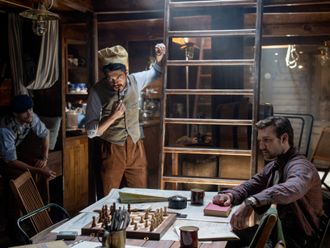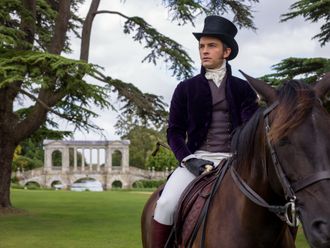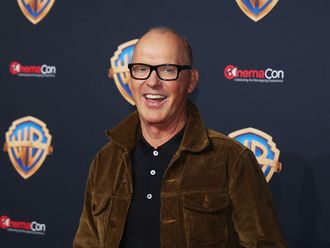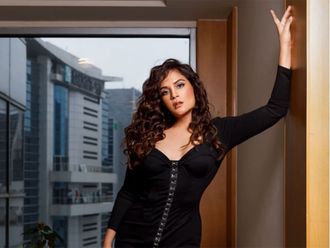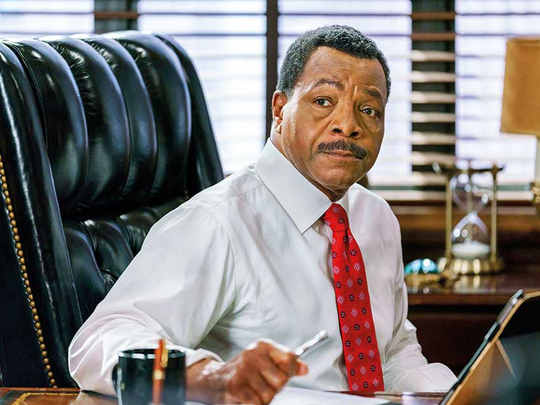
If destiny had gone a different way, actor Carl Weathers might’ve been an NFL star (he played for San Diego State and logged time on the gridiron as an Oakland Raider). Or we might know the Rocky star as an R&B sensation. (He performed in bands as a teen and even released a single — a pleading slow jam called You Ought to Be With Me — in 1981. YouTube. Do it.)
But injuries and good timing conspired to bring the New Orleans native to screens big and small in a host of memorable roles over the course of his 40-plus year career.
From the start, the former linebacker with a B.A. in drama was, naturally, a man of action. Most famously, he played the irresistibly exuberant heavyweight champ Apollo Creed, who was victorious, then later lost in a rematch to “Italian Stallion” Rocky Balboa in Sylvester Stallone’s boxing franchise. He helped Harrison Ford thwart the Nazis in Force 10 From Navarone and faced down the Predator (and lost) alongside Arnold Schwarzenegger. In 1988, Weathers took things literally and finally into his own hands in the underrated Action Jackson. The action star then turned to comedy, giving golf tips to Adam Sandler’s Happy Gilmore (“It’s all in the hips”) and playing a thrifty version of himself on the critically acclaimed Arrested Development. In 2016, he navigated an alien invasion on the Syfy drama Colony.
But sitting in a French cafe in Venice on a recent morning, the still formidable actor is also clearly adept at getting procedural. Currently starring as State’s Attorney Mark Jefferies on Dick Wolf’s latest NBC drama set in the Windy City, Chicago Justice, airing Sundays at 9pm, Weathers, 69, says he was happy to jump into the courtroom.
“It’s Dick Wolf,” he says reverently of the Law & Order mastermind. “You’ve got a guarantee pretty much that it’s not going to be a dog.”
We recently chatted with the actor about justice, his secret singing career and the creed he lives by.
You were an athlete, but had you always been interested in drama too? Or was there a pivot point where you realised that acting was the true, or additional, calling?
There was no pivot. The first play I ever did was in grade school, and that was before I was an athlete. I fell in love with acting. What I fell in love with — most actors, I think, would probably say the same thing — was applause and approval. There’s something about that that’s so heady, particularly when you’re a kid.
I didn’t really start seriously into sports until I got into junior high school. I’ve never really thought this through really well, but I think probably as a young boy, you (play sports) to fit into those groups of guys, and also if you start becoming interested in girls, girls like athletes.
Six words: You Ought to Be With Me. Why has there never been a follow-up single?
Lord, help us. (Laughing)
Clearly, you were a Teddy Pendergrass fan.
I was a huge fan of Teddy’s, and I’d met Teddy and hung out with him after a couple of concerts. Never became like fast friends or anything, but what an amazing talent he was.
What was the inspiration for that song? Was there an actual woman?
No. I recorded before and I started singing with bands when I was a kid, and that’s how I kind of made some money when I was young. R&B and stuff like that. Everybody from Otis Redding to Wilson Pickett to James Brown.
What was the name of your band?
The one in California was called Al and the Rhythm Gents.
When people stop you on the street, does it run the gamut of your roles?
It depends on demographic. The age says it all. If they’re a millennial, Happy Gilmore and Arrested Development. That’s the gold standard for them.
They don’t even know about Rocky?
They can know about it, but that kind of self-deprecating and off-the-wall (humour) just appeals. Then, of course, Rocky in its own way is such a classic for everyone. It’s such a familial way of bonding. Also, where can you go in the world where you can’t talk to someone about Rocky? It connects people in so many ways because there’s so many aspects of it that they love. It’s a buddy film in a strange way, it’s a love story in a strange way, it’s this physical test of one’s ability to persevere. When you think about it, all of those elements I just mentioned are elements we all experience in life. Our own disappointments, our own sometimes lack of believing in ourselves, maybe finding something that inspires us and pushes us beyond where we thought we could be. Ultimately, when you really finally get to a place of enlightenment, what you realise is, you are the greatest competition you will ever face. That statement is one that I think is very, very significant, and it’s understated, but it exists in those movies. You have to push yourself. You have to motivate yourself. You have to find a reason to get up and go on and achieve your dreams, because no one else can do that for you.
Your signature Twitter hashtag is #BePeace. What does that mean to you?
That evokes so much for me, that phrase. I had a buddy many years ago when I played (football) in Canada who would say, “Be the ball, be the ball,” which was this thing that a lot of people say. It’s about whatever you’re doing, be that thing. Don’t separate yourself from it, be it internally and that way it’ll move as you move, it’ll do what you do. If you embody the thing you desire, how can it not be manifested? We keep talking about what we want and we ask, “Why can’t it be?” and “Why don’t ‘they’ do this?” I say, why don’t you do this? Be the very thing that you wish to see in the world, so: Be Peace.




